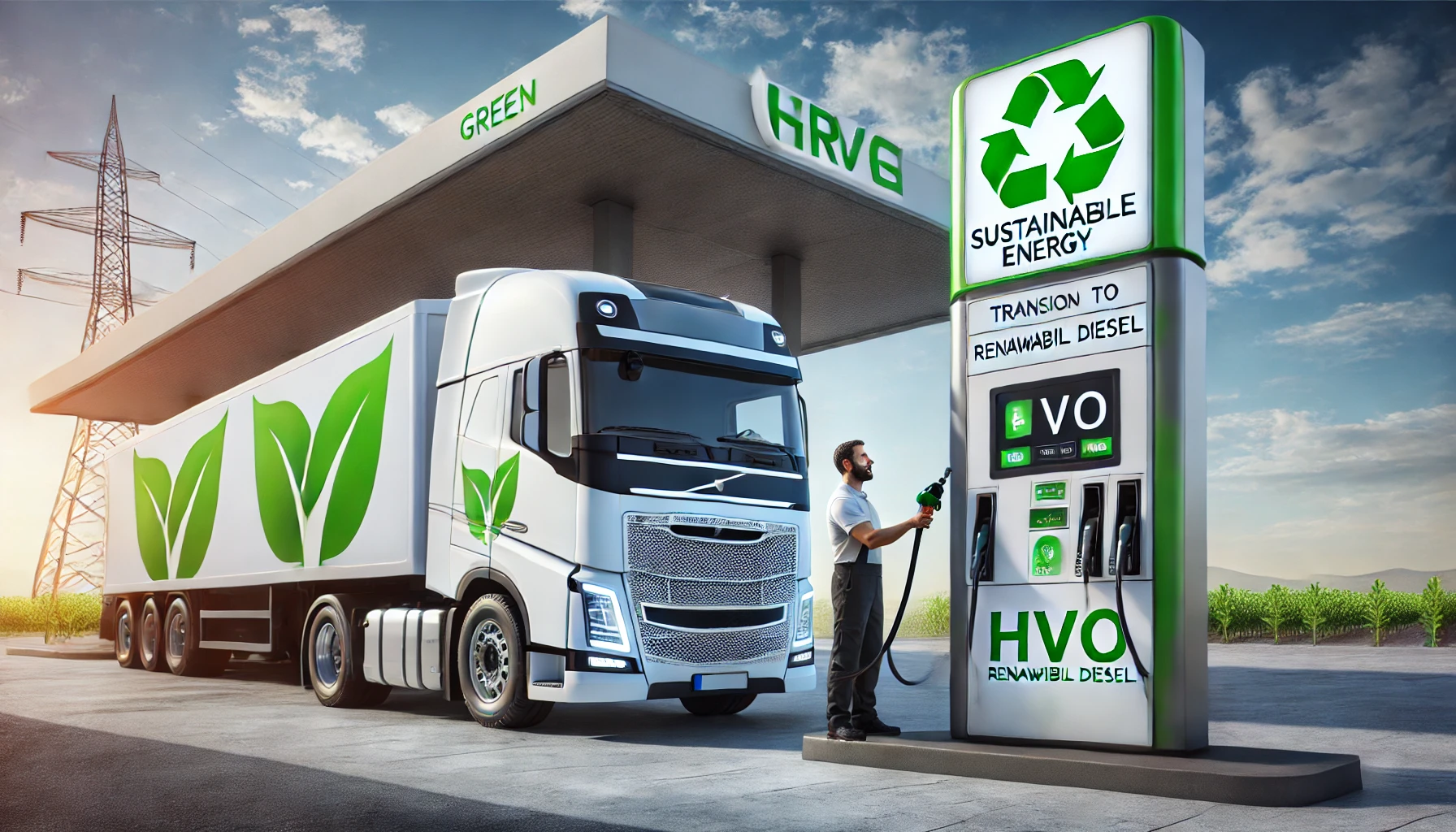Image generated in ChatGPT
As the world pivots toward more sustainable energy solutions, businesses with fleet operations face increasing pressure to adopt cleaner fuel options. HVO (Hydrotreated Vegetable Oil) renewable diesel has emerged as a popular choice for fleet managers and commercial vehicle operators looking to reduce emissions and minimize environmental impact without the need for significant modifications to existing diesel engines.
This article explores the unique advantages of HVO diesel for fleet and commercial use, emphasizing its environmental, operational, and economic benefits.
What is HVO Renewable Diesel?
HVO renewable diesel is a type of synthetic biofuel created through the hydrotreatment of vegetable oils or animal fats. Unlike biodiesel, which is produced via a different process (transesterification), HVO undergoes hydrogenation, resulting in a fuel with a chemical structure closely resembling conventional diesel.
This molecular similarity allows HVO diesel to perform seamlessly in most diesel engines without modifications. However, it’s important to note that older or specialized engines may still require testing or manufacturer approval to ensure compatibility. HVO diesel is compatible with current distribution systems, offering a “drop-in” alternative to fossil diesel.

1. Reduced Greenhouse Gas Emissions
One of the most significant advantages of HVO renewable diesel is its potential to substantially reduce greenhouse gas (GHG) emissions. Compared to traditional diesel, HVO offers up to a 90% reduction in CO₂ emissions when considering its entire lifecycle—from production to combustion.
This lifecycle analysis accounts for the renewable feedstocks, such as waste fats and vegetable oils, which absorb carbon dioxide during their growth. This makes HVO a practical solution for fleets and commercial operators aiming to meet stricter emissions regulations and corporate sustainability goals. It allows companies to lower their carbon footprint without the costs and complications associated with converting to electric vehicles or other alternative fuels.
2. Enhanced Engine Performance and Cleaner Combustion
HVO diesel provides superior combustion characteristics compared to traditional fossil diesel. With a high cetane number—often exceeding 70—it ignites more easily and burns more cleanly in diesel engines. This results in smoother engine performance, reduced noise, and decreased exhaust emissions, particularly nitrogen oxides (NOₓ) and particulate matter (PM).
For commercial vehicles operating in urban areas or sensitive environments, such as delivery trucks or public buses, lower levels of NOₓ and PM contribute to improved air quality and compliance with urban emissions standards.
3. Extended Engine Life and Lower Maintenance Costs
The high purity of HVO diesel, with low levels of impurities, contributes to better engine longevity. HVO lacks components such as sulfur and aromatic compounds found in fossil diesel, which can degrade engine parts over time. As a result, engines running on HVO typically experience less wear and tear, leading to extended engine life and lower maintenance costs.
Fleet managers can see significant savings by extending the lifespan of their vehicles and decreasing the frequency of maintenance visits, which adds to the economic advantage of using HVO over conventional diesel.
4. Compatibility with Existing Diesel Engines and Infrastructure
One of the key benefits of HVO renewable diesel is that it is fully compatible with conventional diesel engines and fuel infrastructure. Since HVO is chemically similar to petroleum diesel, it does not require any engine modifications, making it a “drop-in” solution for fleets.
This advantage sets HVO apart from other alternative fuels like biodiesel, which may need special engine adaptations or handling.
Fleets can switch to HVO without incurring the high costs associated with retrofitting or replacing vehicles, making the transition to greener fuel more financially feasible and less disruptive.
5. Improved Cold-Weather Performance
HVO renewable diesel performs exceptionally well in cold temperatures compared to both conventional diesel and biodiesel. With a low cloud point (the temperature at which wax crystals start forming), HVO resists gelling and remains fluid even in sub-zero conditions.
This is a critical advantage for fleets operating in colder climates, where traditional diesel can thicken or cause operational issues during winter months.
For fleet operators, this means less risk of fuel-related delays, especially for critical services such as emergency response vehicles, utility trucks, and delivery fleets that operate in winter or cold regions.
6. Contribution to Circular Economy and Waste Reduction
A considerable portion of HVO diesel is made from waste fats and used cooking oils. By utilizing these waste products as feedstocks, HVO production supports a circular economy, repurposing waste materials that would otherwise end up in landfills.
In addition to reducing reliance on non-renewable resources, this practice helps decrease the environmental burden associated with waste disposal.
For companies aiming to align with circular economy principles and reduce waste, using HVO renewable diesel represents an opportunity to make an environmentally conscious choice that also benefits their brand reputation.
7. Meeting Regulatory Compliance and Enhancing Public Image
As environmental regulations tighten, particularly in the European Union and other regions committed to reaching net-zero emissions, companies that proactively adopt low-carbon fuels are better positioned to meet compliance standards. Many regions have introduced penalties or taxes for high emissions, and using HVO renewable diesel can help companies avoid these costs.
Moreover, companies that embrace sustainable practices, including using renewable diesel, enhance their public image. As consumers increasingly prefer businesses that demonstrate environmental responsibility, switching to HVO diesel can help fleets gain favor with environmentally conscious clients and partners.
8. Supports Energy Independence and Reduces Oil Dependency
Using HVO renewable diesel promotes energy independence by reducing reliance on petroleum. Unlike fossil diesel, which is sourced from finite resources and often subject to volatile price swings due to geopolitical events, HVO is produced from locally available renewable materials.
This diversification of energy sources helps insulate companies from the unpredictability of fossil fuel markets.
9. Potential for Carbon Credits and Financial Incentives
In many regions, the adoption of renewable fuels like HVO is incentivized through carbon credits or tax reductions. For example, the Low Carbon Fuel Standard (LCFS) in California and similar programs in Europe reward companies that use low-carbon fuels with credits that can be sold or traded.
By switching to HVO, fleets may be eligible for financial incentives that offset fuel costs or create an additional revenue stream, providing an added financial benefit to making the shift to renewable diesel.
A Practical Solution for Cleaner Commercial Operations
HVO renewable diesel presents a compelling option for fleets and commercial vehicle operators seeking a low-emission, high-performance fuel. Its environmental benefits, operational advantages, and ease of integration make it an ideal solution for companies aiming to reduce their carbon footprint without overhauling their existing infrastructure.
By choosing HVO, fleet managers can contribute to a cleaner planet, lower operational costs, and demonstrate a commitment to sustainability. As the demand for renewable energy sources grows, HVO diesel represents a promising step forward in the journey toward sustainable and responsible commercial transportation.


